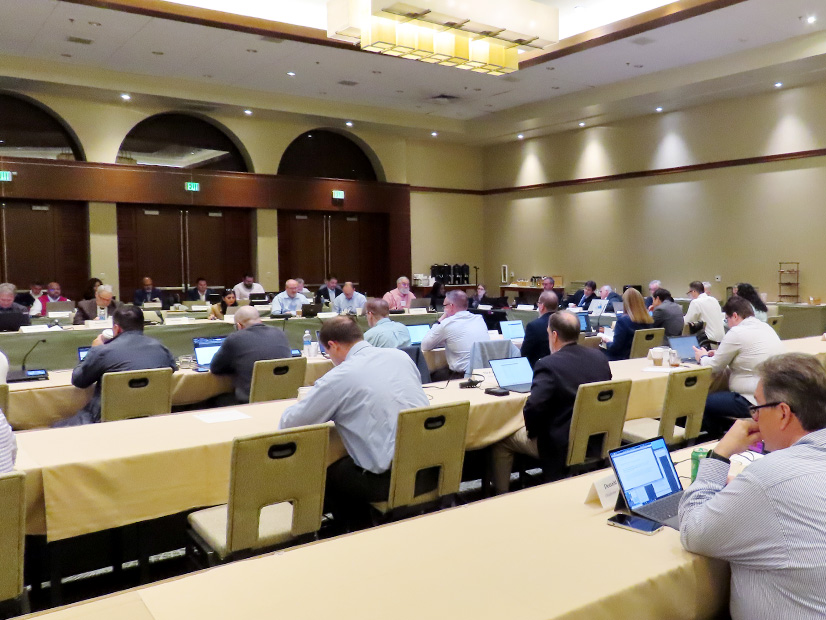In a two-day virtual meeting, members of NERC’s Reliability and Security Technical Committee (RSTC) worked through what Chair Rich Hydzik, of Avista, called “a fairly strong agenda” addressing “issues … as intellectually fulfilling as any group I could imagine at NERC.”
Hydzik opened the meeting by welcoming the RSTC’s incoming members, chosen in an election that closed Nov. 20. Scott Klauminzer, Gayle Nansel, Mohammad Awad and Drew Bonser will represent Sector 2 (State/municipal utility), Sector 4 (Federal or provincial utility/power marketing administration), Sector 7 (Electricity marketer) and Sector 10 (ISO/RTO), respectively.
The new members will replace departing members Saul Rojas in Sector 2, Edison Elizeh in Sector 4 and Eric Miller in Sector 10, whose terms will expire Jan. 31, 2025. The seat for Sector 7 is currently vacant, having converted to an at-large seat after not receiving any nominations in the last election.
Current at-large member Srinivas Kappagantula will take the seat of Mark Spencer in Sector 6 (Merchant electricity generator), whose term also is ending. The remaining seats in sectors 1, 3, 5, 9 and 12 will continue to be held by Todd Lucas, Marc Child, Nicola Parrotta, Darryl Lawrence and Christine Ericson, who were all re-elected. Sector 8 (Large end-use electricity customer), which was also converted to at-large, did not receive any nominations and will remain empty until the RSTC holds a special election.
Strategic Plan and Other Actions
Members unanimously approved the RSTC’s 2025-2026 Strategic Plan, which “guides the functions and core mission of the RSTC [with] a sustainable set of expectations and deliverables,” according to the plan’s introduction (on page 22 of the agenda).
A group of six volunteers from the RSTC membership reviewed the plan, according to Vice Chair John Stephens, director of power system control and planning at City Utilities of Springfield. He said the team “didn’t make any major changes” to the plan because the risk items identified by the Reliability Issues Steering Committee in its biennial risk report, on which the strategic plan is based, have not changed since 2023.
However, Stephens said the team did note that the RSTC formed the Large Loads Task Force and the Electric Vehicle Task Force earlier in 2024 to study the reliability impacts of emerging large loads such as data centers and EV chargers, respectively. He said the plan has been updated to include the work of these groups.
The committee then approved several white papers presenting recommended changes to regulatory processes to encourage the adoption of innovative technology in the electric industry and areas of improvement for identifying and addressing the reliability impacts of distributed energy resources. It also approved a technical reference document outlining how to perform energy reliability assessments.
However, another technical reference document suggested by NERC’s System Planning Impacts from Distributed Energy Resources Working Group (SPIDERWG) ran into headwinds during the meeting, ultimately failing to gain the votes needed for approval.
The SPIDERWG created the report to “document the type and tenor of industry comments” received on a standard authorization request it created to clarify the role of DERs in operational planning assessments and real-time assessments. SPIDERWG Chair Shayan Rizvi said that after the industry’s comments, the group felt that a new standard was not necessary to address the reliability concerns but that a technical reference document outlining the issues involved could be helpful.
However, several attendees expressed concern over the document’s perceived lack of direction. Ahmed Maria, of Ontario’s Independent Electric System Operator, said that while “well written,” the paper “seemed to present a problem and not the solution.” Ryan Quint of Elevate Energy Consulting agreed, proposing that the document be sent back to the SPIDERWG for more development.
“I think that it could really be useful to spend a bit more time laying out a path forward and making sure that it’s well documented, so that if it ever was picked back up, there is a purpose to it,” Quint said. “I just caution throwing this up there as a bunch of problems without solutions.”
After more discussion, Hydzik asked Wayne Guttormson of SaskPower — who had moved to approve the document — if he was willing to withdraw his motion, to which Guttormson assented. Rizvi asked that Hydzik approve a 30-day comment period for the document so that members of the RSTC could share their thoughts in more detail, to which Hydzik agreed.




